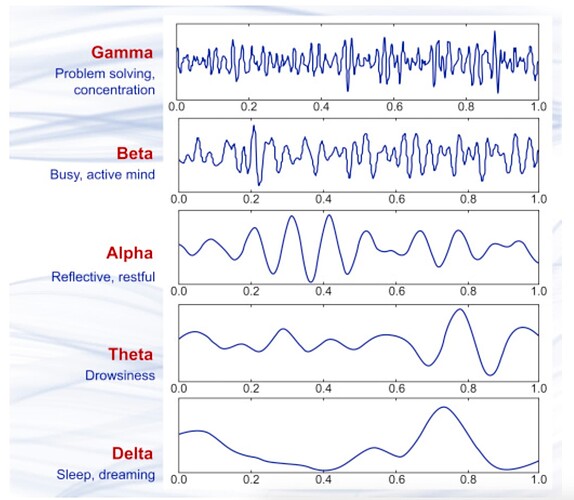There are four categories of these brainwaves, ranging from the most activity to the least activity. When the brain is aroused and actively engaged in mental activities, it generates beta waves. These beta waves are of relatively low amplitude, and are the fastest of the four different brainwaves. The frequency of beta waves ranges from 15 to 40 cycles a second. Beta waves are characteristics of a strongly engaged mind. A person in active conversation would be in beta. A debater would be in high beta.
The next brainwave category in order of frequency is alpha. Where beta represented arousal, alpha represents non-arousal. Alpha brainwaves are slower, and higher in amplitude. Their frequency ranges from 9 to 14 cycles per second. A person who has completed a task and sits down to rest is often in an alpha state. A person who takes time out to reflect or meditate is usually in an alpha state. A person who takes a break from a conference and walks in the garden is often in an alpha state.
The next state, theta brainwaves, are typically of even greater amplitude and slower frequency. This frequency range is normally between 5 and 8 cycles a second. A person who has taken time off from a task and begins to daydream is often in a theta brainwave state. A person who is driving on a freeway, and discovers that they can’t recall the last five miles, is often in a theta state–induced by the process of freeway driving.
The final brainwave state is delta. Here the brainwaves are of the greatest amplitude and slowest frequency. They typically center around a range of 1.5 to 4 cycles per second. They never go down to zero because that would mean that you were brain dead. But, deep dreamless sleep would take you down to the lowest frequency. Typically, 2 to 3 cycles a second.
When we go to bed and read for a few minutes before attempting sleep, we are likely to be in low beta. When we put the book down, turn off the lights and close our eyes, our brainwaves will descend from beta, to alpha, to theta and finally, when we fall asleep, to delta.
https://www.sciencedirect.com/topics/agricultural-and-biological-sciences/brain-waves
DELTA (0.1-3 Hz): Distribution: generally broad or diffuse; may be bilateral, widespread
Subjective feeling states: deep, dreamless sleep, non-REM sleep, trance, unconscious
Associated tasks & behaviors: lethargic, not moving, not attentive
Physiological correlates: not moving, low-level of arousal
Effects of training: can induce drowsiness, trance, deeply relaxed states
THETA (3.5-7.5 Hz): Distribution: usually regional, may involve many lobes, can be lateralized or diffuse;
Subjective feeling states: intuitive, creative, recall, fantasy, imagery, creative, dreamlike, switching thoughts, drowsy; “oneness”, “knowing”
Associated tasks & behaviors: creative, intuitive; but may also be distracted, unfocused
Physiological correlates: healing, integration of mind/body
Effects of Training: if enhanced, can induce drifting, trance-like state. If suppressed, can improve concentration, ability to focus attention
ALPHA(8-12 Hz): Distribution: regional, usually involves entire lobe; strong occipital w/eyes closed
Subjective feeling states: relaxed, not agitated, but not drowsy; tranquil, conscious
Associated tasks & behaviors: meditation, no action
Physiological correlates: relaxed, healing
Effects of Training: can produce relaxation
Sub band low alpha: 8-10: inner-awareness of self, mind/body integration, balance
Sub band high alpha: 10-12: centering, healing, mind/body connection
LOW BETA (12-15HZ): Distribution: localized by side and by lobe (frontal, occipital, etc)
Subjective feeling states: relaxed yet focused, integrated
Associated tasks & behaviors: low SMR can reflect “ADD”, lack of focused attention
Physiological correlates: is inhibited by motion; restraining body may increase SMR
Effects of Training: increasing SMR can produce relaxed focus, improved attentive abilities,
MID BETA (15-18hz): Distribution: localized, over various areas. May be focused on one electrode.
Subjective feeling states: thinking, aware of self & surroundings
Associated tasks & behaviors: mental activity
Physiological correlates: alert, active, but not agitated
Effects of Training: can increase mental ability, focus, alertness
HIGH BETA (above 18hz): Distribution: localized, may be very focused.
Subjective feeling states: alertness, agitation
Associated tasks & behaviors: mental activity, e.g. math, planning
Physiological correlates: general activation of mind & body functions.
Effects of Training: can induce alertness, but may also produce agitation
GAMMA (above 30hz Hz): Distribution: very localized
Subjective feeling states: thinking; integrated thoughts
Associated tasks & behaviors: high-level information processing, “binding”
Physiological correlates: associated with information-rich task processing
Effects of Training: not known




